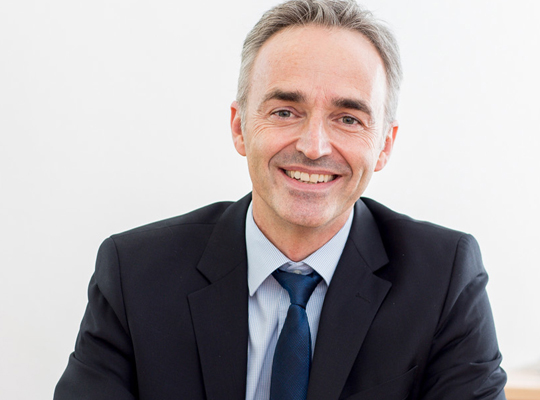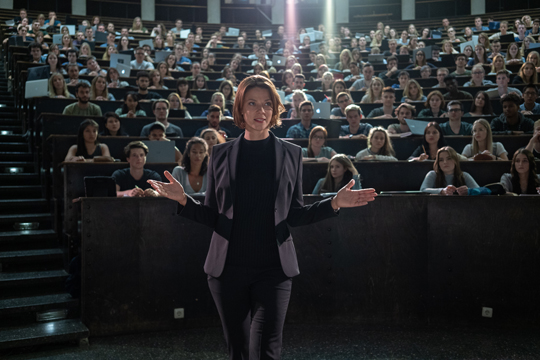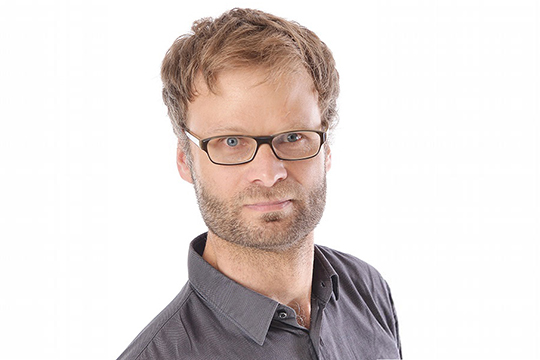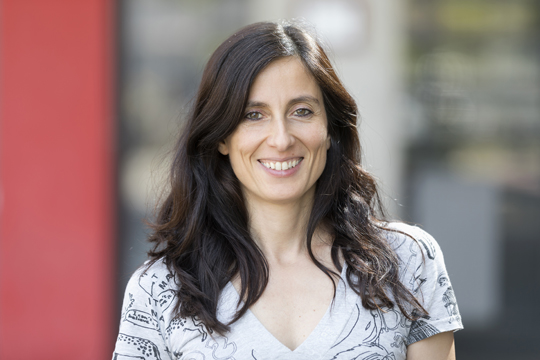“It’s an Unequivocal Win for Us”
Freiburg, Aug 20, 2020
A thriller about the ethical limits of research on humans, set in large part at the University of Freiburg: The entertainment service provider Netflix released the first season of the series Biohackers on 20 August 2020. Moral philosopher Dr. Joachim Boldt, medical researcher Prof. Dr. Toni Cathomen, and synthetic biologist Prof. Dr. Barbara Di Ventura watched the six episodes ahead of their release. Mathilde Bessert-Nettelbeck and Nicolas Scherger asked them for their impressions.
 The protagonist: Mia, a first-year medical student (right), in front of the Freiburg University Library. Source: Netflix
The protagonist: Mia, a first-year medical student (right), in front of the Freiburg University Library. Source: Netflix
Dr. Boldt, Prof. Ventura, Prof. Cathomen: Did you recognize Freiburg and your university in the series?
Joachim Boldt: The University of Freiburg actually looks different from the inside, but the scenery is true to life: The contrast between beautiful natural surroundings and high-tech labs – it looks great.
Barbara Di Ventura: Yes, the university was easy to recognize, and I found the University Library particularly fantastic. But the “Lorenz Excellence Center,” the company the protagonist works at, is evidently not located in Freiburg.
Toni Cathomen: The images are very convincing: of the city, of the Black Forest with the train riding through the mountains, and of the university – I recognized the Institute of Biology and the University Library.
--- SPOILER WARNING! ---
 The series Biohackers is ninety-five percent fiction and five percent science, says Toni Cathomen, director of the Institute of Transfusion Medicine and Gene Therapy at the Medical Center – University of Freiburg. Photo: Medical Center – University of Freiburg
The series Biohackers is ninety-five percent fiction and five percent science, says Toni Cathomen, director of the Institute of Transfusion Medicine and Gene Therapy at the Medical Center – University of Freiburg. Photo: Medical Center – University of Freiburg
In the series, a scientist secretly conducts experiments on human embryos, genetically modified mosquitoes, and viruses in her company laboratories alongside her work at the university. How realistic is the picture of science that is painted here?
Cathomen: Ninety-five percent fiction and five percent science, I would say. For example, it’s possible to produce transgenic mice that carry a gene for the green fluorescent protein in their skin, but you have to illuminate them with ultraviolet light to make them light up. But most of what is shown is not possible today. The speed of the work is also unrealistic. I’d be happy if all the procedures in the lab ran as fast as they do in the series, but that’s not at all what daily life as a scientist is like. And it’s illusory to believe that one and the same researcher could genetically modify plants, humans, and insects. We’re highly specialized in what we do.
Di Ventura: Yes, these characters can really do everything. The main character, Mia, a first-year medical student, produces a red fluorescent protein instead of a green one on the first day of her laboratory class – that’s highly improbable. The gene cutter CRISPR-Cas, which is referred to repeatedly, wouldn’t even be necessary for many of the described modifications. And many applications are simply not possible and probably never will be. For example, you can’t genetically modify all the cells of an adult human, as the character Jasper claims in the series. And you certainly won’t have genetically modified plants sitting on your desk at home – they need to stay in the lab. But all in all, it was well done. I found the series very interesting.
Boldt: The plot reminds me of the case of the Chinese scientist He Jiankui: In November 2018 he claimed to have genetically modified a human embryo for the first time with the help of gene editing technology. It’s still unclear whether that’s true. In the series, a scientist appears who sets out on her own, has her own laboratory, and conducts her own experiments detached from the university – so there are certainly parallels. But the idea that something like this could happen in Germany and that it would be possible to run through the individual steps so quickly is of course fiction. Moreover, the characters are rather simplistic: the researcher who pursues her ambition at all costs and the student who fights for good – I would have hoped for more complexity. But the story is full of suspense, and it shouldn’t be judged according to the motto: Oh dear, and tomorrow this will happen here.
The researcher Lorenz appears in the vein of the classical mad professor and villain from the history of cinema: Have you met people in real life who have such stereotypical conceptions of scientists?
Cathomen: I’ve never experienced that with regard to my own person. It’s clear that we’re not conducting any illegal experiments on humans here. But there are certainly prominent examples of the “mad scientist” stereotype that is also referred to in the series. Such figures are familiar to me as brilliant but somewhat stubborn scientists, such as the biologist George Church, who works in the USA on controversial projects involving bringing mammoths back to life or transplanting organs from pigs into humans. What they are driven by, however, is a vision of what humans can achieve – not, as in the series, power and money.
Boldt: This person appeared to me too to be an inspiration. In his book Regenesis, Church outlines an idea for improving the immune system so that a person can no longer be attacked by pathogens at all. This idea is also present in the plot of Biohackers, but it’s a vision that cannot necessarily be realized in the real world. So there’s always some connection to reality in the series, but then of course everything gets exaggerated. After all, they have to tell an exciting story.
Di Ventura: The character of the researcher Lorenz is very American: No professor at the University of Freiburg would treat her students like that. But I find what she says about synthetic biology convincing – the notion that this technology allows humans themselves to be creators: In biology, we’ve passed from a stage in which we wanted to find out what nature does into a stage in which we can determine what we want to do with nature. Thus, the views presented are somewhat exaggerated, but they aren’t incorrect.
 The antagonist: Professor Tanja Lorenz holds a lecture on synthetic biology. Source: Netflix
The antagonist: Professor Tanja Lorenz holds a lecture on synthetic biology. Source: Netflix
The series shows that the protagonist has to conduct her experiments outside of the university because they are illegal. The ethics committee of the university and medical center is also mentioned several times. What would be the red line in this particular case?
Boldt: The ethics committee would never allow genetic modifications that cause diseases to be performed on healthy embryos. In general, interventions on human embryos in so-called germ-line therapy – as it is correctly referred to in the series – are illegal in Germany. The consequences for the organism are not yet clear enough. Generally speaking, the ethics committee is responsible for examining proposals for clinical studies to be conducted at the university. But of course it doesn’t work with undercover investigators, as indicted in the series.
Jasper is a young scientist working on a topic that affects him personally on account of a disease he has. Is that appropriate from an ethical standpoint?
Boldt: That is one of the best sources of commitment and for understanding a disease. I thus find it unproblematic. Usually such people are interested more in helping people suffering from a disease in the future, because they know what it feels like to live with it – in this case Huntington’s chorea. And that’s a very positive thing. But the character in the series is in a position of dependency and is taken advantage of. And that’s highly problematic.
Vectors are another technology that plays a prominent role in the series. What are they?
Cathomen: It remains relatively vague what kind of vectors are meant, but I assume the authors were thinking about so-called viral vectors. They are clinically approved vectors that enable the targeted treatment of certain genetic defects and that are already being used on patients. For example, we can help people whose blood lacks a coagulation factor: The necessary gene is introduced into the liver cells, where the factor is produced and released into the blood.
It is claimed in the series that research in synthetic biology is developing too quickly for textbooks and that China and the USA have an edge in the transfer of technologies to clinical medicine. Is that true?
Cathomen: There’s a lot of truth to that. Germany and Europe are lagging behind. And it’s also true that a textbook in a field that is developing so quickly soon becomes obsolete. There are hardly any textbooks on the topic of CRISPR-Cas, for example. I wouldn’t go to the trouble of writing one either, because it would be outdated so quickly.
What advice for the future would you like to give prospective or current students who watch this series?
Di Ventura: Work as hard as Professor Lorenz’s assistant (laughs) No, but simply: Be careful. It’s not as easy as it looks. It’s unrealistic how quickly the students are capable of doing things like synthesizing genetic constructs or using CRISPR-Cas. That’s all very exciting, but it’s hard work and it takes a bit longer to get to that point.
There’s a real biohacker community in the series. Is that realistic?
Boldt: In the environment of the iGEM competition – short for “International Genetically Engineered Machine Competition” – there absolutely are students who try out a lot of things in the university laboratory, largely under their own responsibility. That’s of course completely different in the series, with the lab in a cabin, but it’s obvious what it was inspired by.
Di Ventura: And in the USA in particular, there are garage laboratories, and the idea of meeting people and trying something out together is already widespread there. There are also companies that synthesize genes where you can order things like DNA segments for toxins that have adverse health effects.
 The series draws on reality but then exaggerates the representations for reasons of dramatization, sums up Joachim Boldt, deputy director of the Department of Medical Ethics and History of Medicine. Photo: Conny Ehm
The series draws on reality but then exaggerates the representations for reasons of dramatization, sums up Joachim Boldt, deputy director of the Department of Medical Ethics and History of Medicine. Photo: Conny Ehm
But isn’t that regulated?
Boldt: Such community labs are legal in the USA. And there aren’t any regulations in Europe either on what companies that produce gene segments have to check when someone orders them. From my perspective, that’s an open field. A few years ago, journalists tried that out, had them delivered to their private addresses – and they received what they ordered. It’s not how one would wish things to be.
Di Ventura: That surprises me, because we always need an identification number to order something in the lab. It takes a few days to get it – with the explanation that they first have to check whether we’re really a scientific institution. In any case, it would be worrying if these companies could simply have someone synthesize something potentially dangerous.
Cathomen: It would indeed be an alarming scenario if someone used gene synthesis to produce extremely pathogenic viruses. This possibility is also alluded to in the series with the mosquitoes. It used to be that you had to first obtain a virus to work with it in the lab. Today I can order the sequence for the virus if I know it and then produce it in the lab. Even master’s biology students at our university would be able to do that.
Another issue is what you can find out from the DNA – from reconstructing a person’s face to determining the date of their death. What do you think about the picture the series paints in this regard?
Boldt: As with many other issues, I would hope here too that people make a distinction between fiction and drama on the one hand and the real possibilities on the other. If you can’t do that, then you’ll be misled by this series. It addresses a lot of ethical questions: Do you have to know everything you can know about your own life from your own DNA? This was a topic of great debate in Germany too, as was data security: Professor Lorenz has stored all of this sensitive data at her house, which is completely crazy. Such portrayals make me feel somewhat uneasy, because of course it’s good that important issues are being mentioned – but they’re always touched on only briefly, and then there’s a cut, the next scene, a different topic. I think it’s a shame that such fascinating discussions aren’t taken up as a recurring element of the plot.
Di Ventura: But the moments for ethical issues are there. For example, one of the test subjects says that she doesn’t want to know what she’ll die of – and that shows the audience: Okay, there are people who reject that. That’s enough, in my opinion, to get people thinking about how they stand on the issue themselves.
Cathomen: If you really want an in-depth discussion about ethical issues, you should maybe watch a talk show instead. The series moves an extremely fast pace, to keep up the suspense.
 The plot can make people curious about topics like synthetic biology or gene therapy, thinks Barbara Di Ventura, professor of biological signaling research at the Faculty of Biology. Photo: Jürgen Gocke
The plot can make people curious about topics like synthetic biology or gene therapy, thinks Barbara Di Ventura, professor of biological signaling research at the Faculty of Biology. Photo: Jürgen Gocke
Would you say that such a format is helpful, because it can perhaps appeal to an audience that would otherwise have little interest in science and give them something to think about?
Di Ventura: It was the first time I’d seen a definition of synthetic biology in a television series. That’s fantastic. Even though most of the scientific content in it is unrealistic, I think the series can make people curious. Perhaps people will be interested in learning a bit more about synthetic biology or about gene therapy after watching the show. Then we’ll have the opportunity to explain what’s realistic and what will perhaps only be possible in the future. And it’s also original that the series is set in Freiburg. We’re portrayed as one of the best German universities – that’s an unbelievably nice complement for us.
Cathomen: A lot of television series are set in a medical environment. But it’s clear that they’re fictional. I don’t think a person who watches a series about doctors will then consider maybe studying medicine. But I do think that Biohackers can get people thinking about our disciplines and motivate them to learn more about them – and the University of Freiburg comes off very well in it. So it’s an unequivocal win for us.

